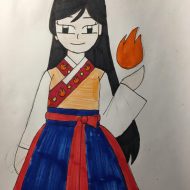Jowangshin : The Household Goddess
Listen
At a glance
| Description | |
|---|---|
| Origin | Korean Mythology |
| Classification | Gods |
| Family Members | N/A |
| Region | South Korea |
| Associated With | Kitchen, Household, Fire, Hearth |
Jowangsin
Introduction
The goddess of fire and the hearth in Korean mythologyis known as Jowangshin. Housewives typically continued the rituals performed in her honour because she was the goddess of the hearth. Although she is no longer worshipped, she is still one of the most well-known Korean deities. In Korean mythology, Jowangsin is regarded as the Gasin-Goddess of Fire and the hearth. She is similar to goddesses such as Hestia and Vesta from Greco-Roman mythology.
Jowangsin, who has been underwater for many years, is believed to be able to control fire, water, and ice together. This aspect of her being is similar to that of a kitchen goddess. The main food of Koreans is steamed rice, which requires both fire and water to produce.
Physical Traits
As Jowangshin is believed to be the goddess of the kitchen and hearth, she is usually depicted as a young Korean wife. In certain myths she takes the form of an old crone who helps people. She is protective of the home and warm center, and she is often seen as a friendly and helpful goddess who loves to gossip with other housewives in the kitchen.
Family
Jowangsin, the goddess of the kitchen, hearth, and fire, was created by Cheonjiwang to atone for her time spent in the icy lake. As a result of Noiljadae hanging herself in the restroom, Cheuksin, was born. It was frowned upon in Korean culture to place the bathroom next to the kitchen or to have the bathroom door open toward the kitchen because of Cheuksin’s feud with Jowangsin.
Other names
Jowangsin is known by different names like Joshin which means Kitchen Goddess, Jowanggaxi meaning woman who is the king of the kitchen, while Jowangdaeshin is another name that means a great goddess and the king of the kitchen. Another popular name is Buttumakshin which means goddess in the hearth.
Powers and Abilities
The water bowl that was kept on a clay altar above the fireplace was thought to represent Jowangshin. Every morning at dawn, the housewife kneeled in front of the bowl, filled it with fresh water from a nearby well, and wished for luck. South Korea had a particularly advanced Jowangshin ritual. Each festival also included Tteok (rice cake) and fruits as a way of honoring Jowangshin.
Housewives were required to abide by the following five rules because Jowangshin was thought to record household events and broadcast them to heaven.
1. When near a hearth, avoid using curse words.
2. Don’t sit on the fireplace.
3. Keep your feet off the hearth.
4. Keep the kitchen spotless.
5. In the kitchen, you can adore different gods.
Modern Day Influence
The worship of Jowangshin is no longer prevalent in Korean society and unlike many of the other ancient gods, not many temples exist. However, stories of Jowangshin are still told through various artforms in South Korea.
Related Images
Frequently Asked Questions
Who is Jowangshin?
In Korean shamanism, Jowangshin is regarded as the goddess of the hearth and fire. The rituals related to her were often performed by housewives. Although she has since become a non-subject of worship, she is still one of the most popular deities.
How do people worship Jowangshin today?
In modern Korean society, the practice of worshipping Jowangshin has largely ceased. In contrast to the other ancient deities, there are no temples dedicated to her. But, she is still a highly popular deity.
What is the significance of Tteok in Korean culture?
This type of rice cake is commonly made with steamed flour and various grains. It is regarded as a seasonal delicacy and dessert. Tteok is also often served as a meal or shared with friends and relatives. It is called “boktteok,” which means “good fortune rice cake,” and is usually offered to the spirits and to the goddess Jowangshin.
Are there any festivals dedicated to Jowangshin?
In southern Korea, the rituals related to Jowangshin were highly developed. During festivals, she was often honored with fruits and rice cakes called Tteok.







